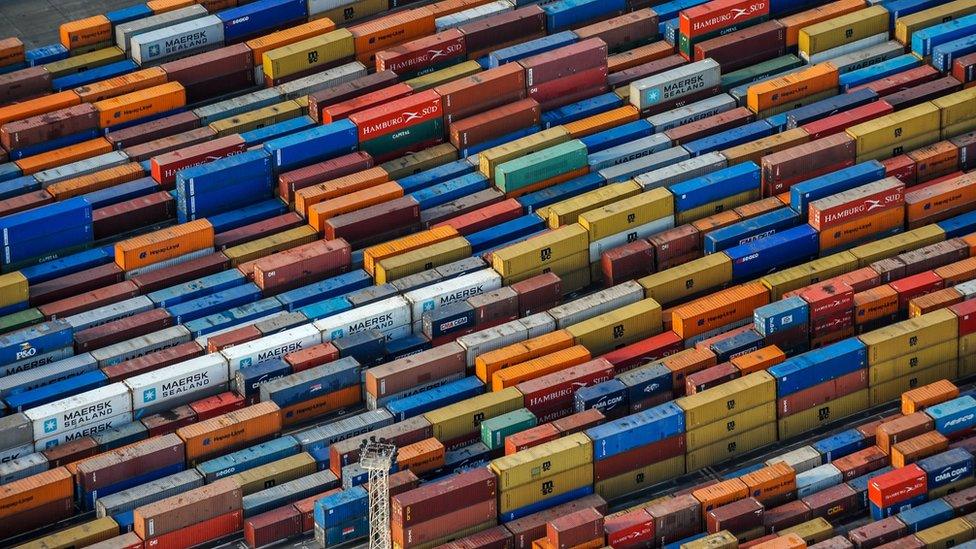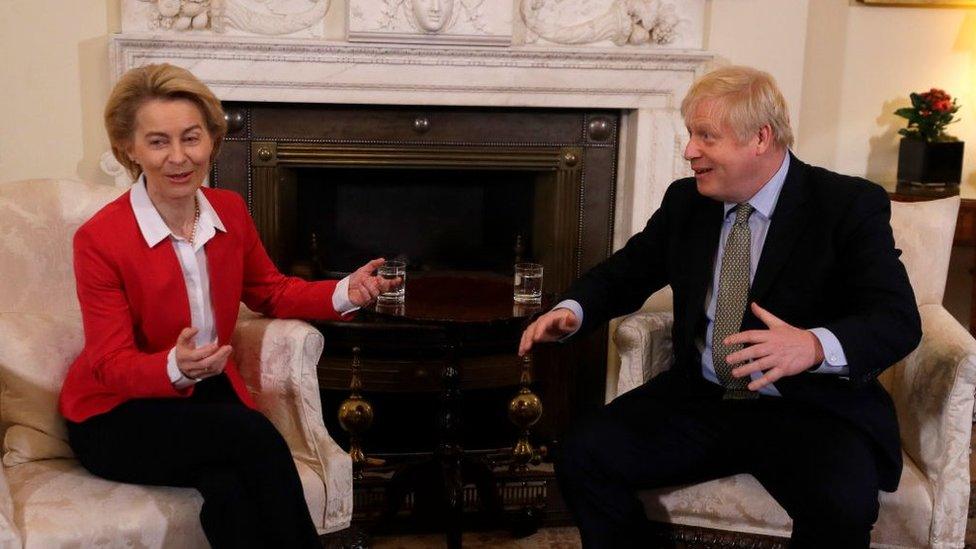Brexit: What is a level playing field?
- Published

It's a term which was heard a lot during the post-Brexit trade negotiations. It's about fair competition, and it's much less easy to visualise or explain than fishing or the trade in cars.
But it gets to the heart of what Brexit is all about.
So how did the UK and the EU reach a deal on the level playing field, and how will it work in practice in the future?
What does level playing field mean?
The level playing field is a trade-policy term for a set of common rules and standards that prevent businesses in one country gaining a competitive advantage over those operating in other countries.
These could be rules limiting the type of zero-hours contracts that can be offered to workers, for example, or restrictions on the amount of pollution certain industrial processes are allowed to produce.
It's about fair and open competition and it's an important part of the EU single market in which member countries allow the free movement of people, goods, services and capital.
The focus in the EU-UK trade deal, agreed in December 2020, is on regulations that cover environmental standards and labour law, and on state aid (or government subsidies for business).
In the negotiations, the UK was determined to assert its sovereignty - which meant its independence from EU rules - while the EU was determined to protect its single market and control access to it.
Did either side win?
Both sides can claim to have got what they wanted from the deal.
It contains stricter level playing field conditions than in other recent trade agreements signed by the EU. So, the EU has created strong protections for the single market.
But the UK has the right to break away from EU rules if it chooses to do so, and there is no role in enforcing the deal for the European Court of Justice. And that meets the UK demand for sovereignty.

What was agreed in the trade deal?
The two sides agreed to treat current shared regulations on environmental protection and workers' rights as a common baseline.
The UK is free to change those standards in the future (as is the EU), but there is a potential price to pay. Built into the deal is the risk that if the UK moves too far from EU rules, in a way which is deemed unfair to EU businesses, its access to the European market could be limited.
The same applies the other way round.
Under this "rebalancing mechanism", tariffs (or taxes on goods crossing borders) could be imposed, and they wouldn't always have to be in the same policy area where the dispute occurs.
Either the EU or the UK could also impose tariffs without the agreement of the other side, if they think that government subsidies are distorting trade.
But, importantly, all those decisions would have to go to independent arbitration.
An arbitration panel would involve representatives from both sides as well as independent experts or judges.
State Aid
It was agreed that the UK would not copy EU state aid rules directly, even though that had been the EU's initial demand in the trade negotiations.
Instead it is setting up an independent state aid authority, and has now published legislation in the form of a new Subsidy Control Bill which will create a new subsidy system.
The government says its new regime will be more nimble than the EU's, and will allow it to focus on its domestic priorities.
But if the UK changes its rules too much, the EU will have the power to retaliate.
Why is all this important?
The level playing field agreements cover billions of pounds worth of business now and in the future.
The UK has certainly won the theoretical right to break away from EU rules, but it will have to make a careful calculation about whether such moves will be either necessary or worthwhile.
It has a tariff-free trade deal with its largest economic partner for now, but there is no guarantee that it will stay that way.
On the other hand, it's not always easy to prove that fair competition is being distorted - or the extent to which a change in regulations might be responsible for any distortion.
So the role of the new arbitration system will be crucial, and could become controversial.
The EU-UK agreement also set up a new Partnership Council, with more than twenty committees and working groups. It will look into various aspects of how the relationship develops in the future, and will seek to resolve disputes.
Both sides also have the right to call for a formal review of the entire agreement if they think it isn't working well, and there will be an automatic review anyway after five years.
That means a future UK government, which thinks market access is more important than the current government's notion of sovereignty, could choose to interpret the deal in a different way.
So, as a political issue, it's not going to go away.


